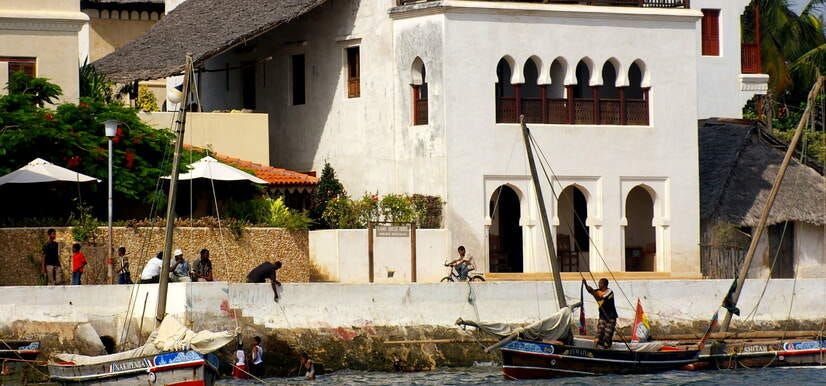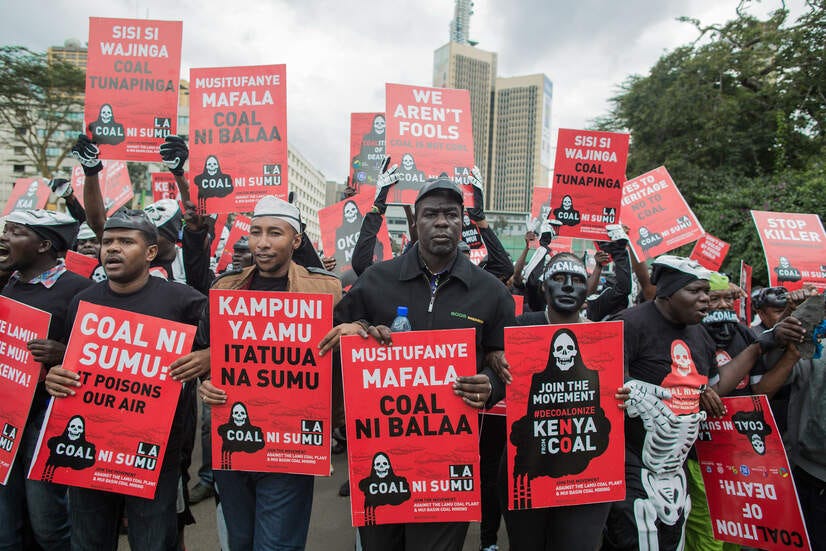Welcome to this latest edition of From a Climate Correspondent. If you'd like to support us, check out our Patreon page, or invite us for a coffee over at KOFI page. Thanks for reading!

A new coal plant, right next to a UNESCO world heritage site, on a piece of Kenyan coast famous for its coral, fish, and mangroves, planned to be built just as the countries financing it are meant to be taking climate change seriously. The idea always seemed a bit incongruous.
The Lamu plant was part of the Kenyan government’s “vision 2030” development plan to install 10,000 megawatts of electricity generating capacity by 2030, a target recently brought down to 7200. It was a key component of the controversial Lamu Port South Sudan Ethiopia Transport (LAPSSET) corridor plan, which would see large amounts of high-carbon infrastructure including oil pipelines, airports, and a new port built in and through Kenya. Those plans always sat uneasily next to Kenya’s climate targets. The country has pledged to reduce its carbon emissions by 30% by 2030, which leaves little room for fossil fuel expansion in its carbon budget.
As was reported last year, hundreds of Lamu residents — whose lives and livelihoods were under threat from the planned coal plant — feared they would be displaced by the plant’s construction, that fish and other marine life would be poisoned, and the air polluted.
But campaigners are now celebrating because it looks like the Lamu coal plant may finally have reached a hurdle it can’t jump. Where environmental impact assessments, public protests, legal challenges, and new environmental impact assessments as a consequence of those legal challenges have failed, money (inevitably) seems to have been decisive.
Because in mid-November, local campaigners learned that the Industrial and Commercial Bank of China (ICBC) was planning to withdraw its financing from the Lamu coal power plant project. And that might be that for the dirtiest of elephants in the room.

Environmental impact
According to a statement by Save Lamu, one the groups at the forefront in opposing the power plant, the ICBC had decided not to finance the project after all due to the environmental and social risks associated with it.
“We are very happy and grateful to hear that the ICBC will no longer fund Amu Power for the coal project,” Is’haq Abubakar, Save Lamu Vice Chairperson, told my DeSmog colleague Maina Waruru. “We as Save Lamu will always be there to defend its people and our environment; we don’t want a coal project in Lamu County and in Kenya at large.”
But in June 2019, local communities got some respite when the National Environment Tribunal revoked a license granted to Amu Power, a consortium of Centum, Gulf Energy, and Chinese firms building the $2 billion coal plant, due to a technical fault with its environmental impact assessment. But communities weren’t convinced the companies wouldn’t find a way to work around the issue.
They are more confident now.
Citizens v Corporations
This was a victory for “dedicated Kenyan campaigners up against the might of financial heavyweights and global corporate interests”, Mohamed Adow, founder of the Nairobi-based thinktank Power Shift Africa, wrote in an op-ed in The Daily Nation.
That was symbolised not just by the names of the companies that backed it, but by the firm they chose to represent the Kenyan-American-Chinese consortium. According to reporting by regional newspaper, The East African, the group was represented by FTI Consulting, a company that has recently been making negative headlines across the world for its fossil fuel work.
The firm was the subject of a recent investigation by the New York Times that showed it “helped design, staff and run organizations and websites funded by energy companies that can appear to represent grass-roots support for fossil-fuel initiatives.”
For groups such as FTI, and the polluting interests they work for, the Lamu coal power plant was just another project; to proceed or stop depending on economics and little else. But for the residents of the astonishing piece of coastline, and for millions of Kenyans, it symbolised much more than that.
If the powerplant plan really is dead, Kenyan can once again claim to be one of the region’s climate champions. As the residents of Lamu have found, that status, and the environmental safety it implies, is very hard won.
If you’d like to support us to publish more journalism from the front lines of climate change, please consider supporting us with a regular donation on Patreon or inviting us for a one-time coffee over at KOFI. You can also support use by signing up and sharing this article with others!
Must reads from the region
Environment award for man who stopped new coal power plant in Ghana, Huong Ly and Trystan Young, BBC News
Environmental campaigner Chibeze Ezekiel has won the prestigious Goldman Environmental Prize for leading a grassroots campaign to stop a new coal-fired power station being built in Ghana. The BBC has a nice video profile of him and how his efforts made a nationwide impact.
Africa And Electric Vehicles: Overtaking Mere Hype For Rare Vibe, Elizabeth Ajao, Wee Tracker
A long feature from business outlet Wee Tracker somewhat bursts the hype-bubble around the launch ‘of the all-electric Hyundai Kona, unveiled by Lagos state Governor, Babajide Sanwo-Olu this week. It points out that all the normal obstacles remain to EV adoption — reliable electricity, charging infrastructure, competitive prices — but that these are writ particularly large in Africa.”Africa still has quite a long way to go on the journey to the adoption of electric vehicles. However, it’s great to see that work has begun on that front, however slowly,” the article concludes.
Climate change, migration and urbanisation: patterns in sub-Saharan Africa, Roman Hoffmann, The Conversation
An article by a postdoctoral researcher at the Potsdam Institute says counters the narrative often promoted by politicians “that ‘waves’ and ‘rising tides’ of climate migrants are crossing the border to Europe and the US.” In fact, most environmental migration is internal and, in sub-Saharan Africa, it’s from pastoral or agricultural areas into cities, putting massive strain on already stretched urban resources.
Africa must declare a climate emergency, urges Greenpeace report, ESI Africa
A new report from Greenpeace summarises the science around climate impacts on Africa. Ndoni Mcunu, climate scientist, founder of Black Women in Science and co-author of the report calls for the science to be better understood and reflected in policy decisions, as well as African researchers being “more involved in leading the development of new databases and models rather than being dependent on countries outside Africa.”
Cape Town could experience another 'Day Zero' this century as water supplies dry up, Kim Harrisberg, Thomson Reuters Foundation
In 2018, a drought in South Africa that nearly caused Cape Town's taps to run dry, which became known as Day Zero. New research says Cape Town faces an 80% higher chance of another 'Day Zero' drought by the end of the century if greenhouse gas-emissions keep rising at current rates. The study also showed that the 2018 drought was made five-six times more likely by human-caused climate change.
What else I’ve been reading
I’m gradually making my way through a series of visual reports by Paraguayan outfit El Surti (with a lot of help from Google translate) on the power of the country’s oligarchy. The journalism is of a type i’ve never seen before — heavily visual but still incredibly detailed and informative. Check out their reports on how more than 100 state suppliers avoided legal obligations to declare their assets, and why Paraguay keeps having substantial power cuts.
Who we are
From A Climate Correspondent is a weekly newsletter run by four journalists exploring the climate crisis from around the globe. We regularly also feature guest writers.
Lou Del Bello is an energy and climate journalist based in Delhi, India.
Jocelyn Timperley is a climate journalist based in San José, Costa Rica.
India Bourke is an environment journalist based in London, UK.
Mat Hope is investigative journalist based in Nairobi, Kenya.


